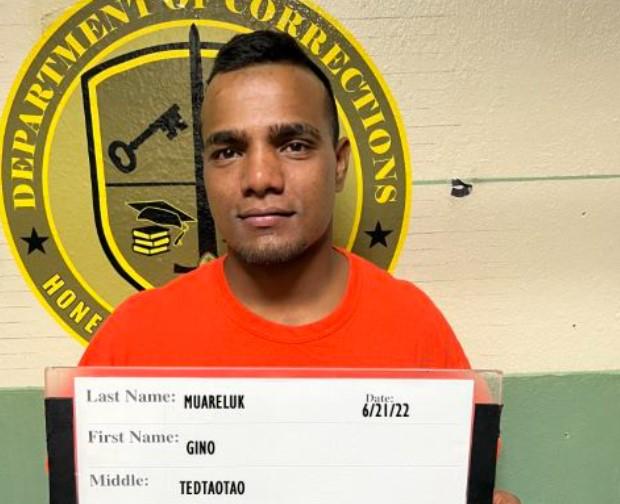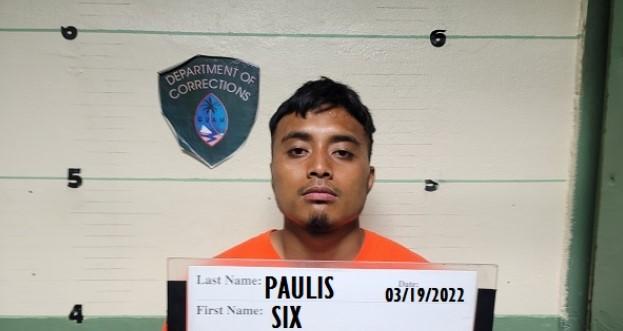If the public wants Superior Court of Guam judges to have more discretion to jail criminal defendants while they await trial, then the legislature will need to change the law governing pre-trial jailing.
According to a new report published by Chief Justice Robert Torres, judges are limited by the law in how they decide whether to jail someone charged with a crime. In a report, the Judiciary of Guam says local law, for the most part, “mandates defendant release.”
The report appears to be a counter to monthly reports by Attorney General Douglas Moylan showing the numbers of criminal defendants on pre-trial release who either violate the terms of their release, or commit new crimes while awaiting trial.
The attorney general’s accounting of pre-trial release offenses began, when he took office in January. The new judiciary report likewise is collecting and reporting data for crimes allegedly committed since January.

“In 2023, Chief Justice Robert J. Torres tasked the [Pretrial Services] Office with tracking the performance and effectiveness of the pretrial justice system,” the court report states. “To achieve this, data was collected for all new cases filed since the beginning of the administration in January 2023 until July 20, 2023.”
According to the court report, 363 criminal defendants charged since January still are awaiting trial or some kind of conclusion to the charges they face. Of those 363 defendants, 222 were released back into the community awaiting trial, and 141 are jailed.
Of those released, judges have had to issue warrants for 38 of them who failed to appear before the court or for mandatory pretrial release services (such as drug testing). Twenty four were arrested committing new crimes. Of those 24, five of them were arrested for allegedly committing violent crimes.
“According to the report, 98 percent of all released defendants were not arrested for a new violent offense, 89 percent remained arrest-free, and 83 percent were not issued a warrant for Failure to Appear (FTA) in court,” according to the court report.
While the court report celebrates the majority of criminal defendants who appear to be complying with their pre-trial release conditions, the attorney general has focused attention on those defendants judges release who constantly are arrested while awaiting trial. Of the five defendants who allegedly committed violent crimes while awaiting trial, the list of offenses include aggravated assault, criminal burning, retail theft, resisting arrest, and drug possession, “arguably creating more crime victims,” according to the Office of the Attorney General report for July.
 Criminal defendant Gino Tedtaotao Muareluk is one of those five. After an alleged spree of nine separate violent crimes, each time increasing in level of violence, since 2021, Mr. Muareluk was detained last week following a July 31 arrest for third degree family violence. The victim in this case is new; the previous eight cases all involved a woman who reportedly tried repeatedly to keep the defendant away from her. Each time he was arrested and magistrated in the Superior Court of Guam, however, a judge released him, only for him to pick up a new charge of violence.
Criminal defendant Gino Tedtaotao Muareluk is one of those five. After an alleged spree of nine separate violent crimes, each time increasing in level of violence, since 2021, Mr. Muareluk was detained last week following a July 31 arrest for third degree family violence. The victim in this case is new; the previous eight cases all involved a woman who reportedly tried repeatedly to keep the defendant away from her. Each time he was arrested and magistrated in the Superior Court of Guam, however, a judge released him, only for him to pick up a new charge of violence.
The July case is the third one against Mr. Muareluk since December.
 Another one of the five who account for the court and AG statistics is Six Paulis, who also has multiple cases involving violence against other people.
Another one of the five who account for the court and AG statistics is Six Paulis, who also has multiple cases involving violence against other people.
 Another is Malcolm Chaco, who was arrested recently after leading police on a high speed chase through southern villages. He was ordered to be confined to house arrest earlier this year on charges he locked up and repeatedly beat a woman known to him. That crime allegedly happened while Mr. Chaco was on pre-trial release for a previous case.
Another is Malcolm Chaco, who was arrested recently after leading police on a high speed chase through southern villages. He was ordered to be confined to house arrest earlier this year on charges he locked up and repeatedly beat a woman known to him. That crime allegedly happened while Mr. Chaco was on pre-trial release for a previous case.
“We believe the release conditions are not effectively stopping more crimes from occurring from these persons,” Attorney General Douglas Moylan said. “After eight months prosecuting crimes, the additional harms and lack of respect from those released is not going down and has increased by seven from the prior month. We ask our Senators to pass tougher legislation that prevents the above numbers and better protects us against criminals.”
The law both the AG and the chief justice refer to can be found in Guam Code Annotated’s Title 8, at subsections 40.10 and 40.15.
Guam law currently states:
§ 40.10. Release on Bail Generally Permitted. At his first appearance before a judge of the Superior Court, every person charged with an offense shall be ordered released pending trial in the manner and subject to the conditions provided by §§ 40.15 and 40.20.
The law goes on to provide some leeway for judges:
§ 40.15. Release on Own Recognizance Defined; When Permitted.
(a) As used in this Section, ‘release on own recognizance’ means release of the person charged without bail and upon his written agreement to appear in court at all required times and places and to fully comply with any other court-ordered conditions and restrictions.
(b) The judge shall order the person charged to be released on recognizance, unless the judge determines, in his discretion, on the basis of available information, that such a release will not reasonably assure the appearance of the person as required or will endanger the safety of any other person or the community.
(c) In determining whether there is a substantial risk of nonappearance by the person charged or that the person charged will endanger the safety of any other person or the community, the judge shall consider the following factors:
(1) the nature of the offense charged, the apparent possibility of conviction and the likely sentence;
(2) the history and characteristics of the person charged, including:
(A) length of his/her residence on Guam;
(B) his/her employment status and history, and financial condition;
(C) his/her family ties and relationships;
(D) his/her reputation, character, and mental and physical condition;
(E) his/her prior criminal record, if any, including any record of prior release on recognizance or on bail;
(F) his/her history relating to drug or alcohol abuse;
(G) the identity of the reasonable members of the community who will vouch for his/her reliability;
(H) whether, at the time of the current offense or arrest, he/she was on probation, on parole, or on other release pending trial, sentencing, appeal or completion of sentence of an offense under federal, state or local law; and
(I) his/her history of compliance with other court orders;
(3) the nature and seriousness of the danger the person would pose to the community or to any individual member thereof if released;
(4) statements of the alleged victim or others as to previous incidences of violence and threats made to the alleged victim;
(5) lethality risk assessments or other risk assessments deemed appropriate by the Judiciary of Guam; and
(6) any other factors which bear on the risk of willful failure to appear or the danger the person would pose to the community or to any individual member thereof if released.
(d) Nothing in this Section shall be misconstrued as modifying or limiting the presumption of innocence.






3 Comments
Alan San Nicolas
08/11/2023 at 5:35 AM
Na siguru na en katayi, en emai, en Instagram, lepblo-fasu si D.M. ni este na lai (na’i un kopia). AFAÑELOS, u-uchan yan palaksi I katsada (chalan).
High card
08/12/2023 at 2:05 AM
PAIGE OF JUSTICE
” I am writing about my life experience and relate or share similar experiences, for those to understand and not “JUDGE ” the book by its cover.”
-For those who are free but not free.
-For those incarcerated.
Know that you are not forgotten.
Corruption of power and violations of constitutional rights, specifically Amendments 1, 2, 4, 5, 6, 7, and 8, are deeply concerning issues that undermine the very foundations of justice and democracy. The misuse of power by those in positions of authority has led to a disturbing erosion of individual liberties and the principles upon which our island and nation was built.
Amendment 1 guarantees the freedom of speech, religion, and assembly. Yet, I experienced or witness instances where individuals are unfairly silenced or targeted for expressing their opinions or practicing their faith. This stifling of dissent and the suppression of diverse viewpoints weaken the democratic fabric of our society.
Amendment 2 ensures the right to bear arms, but it is essential to balance this right with responsible regulations. However, there have been instances where this amendment is used to justify excessive force or neglect for public safety. Striking a balance that upholds both individual rights and the well-being of the community is crucial.
Amendment 4 safeguards against unreasonable searches and seizures. However, there have been instances where law enforcement oversteps its boundaries, conducting searches without proper justification or disregarding privacy rights. These violations undermine trust in the justice system and infringe upon peoples’ right to be secure in their persons, houses, papers, and effects.
Amendment 5 protects individuals from self-incrimination, double jeopardy, and guarantees due process. However, there are cases where individuals are denied fair trials, coerced into self-incrimination, or subjected to excessive punishment. Such violations not only undermine the principle of innocent until proven guilty but also erode confidence in our legal system.
Amendment 6 guarantees the right to a fair and speedy trial, including the right to legal counsel. Unfortunately, there are instances where individuals, particularly those from marginalized communities, face inadequate legal representation or prolonged delays in their trials. These infringements deny individuals their fundamental rights and compromise the integrity of our judicial system.
Amendment 7 ensures the right to a trial by jury in civil cases. However, there have been cases where this right is disregarded or undermined, depriving individuals of a fair resolution to their disputes. Upholding the sanctity of a jury trial is crucial in ensuring impartiality and justice for all.
Amendment 8 prohibits cruel and unusual punishment. Yet, we see instances where excessive force is used or where individuals are subjected to inhumane treatment while in custody. These violations not only violate the dignity of individuals but also contradict the principles of justice and rehabilitation.
Addressing these issues of corruption and constitutional violations requires a collective effort to hold those in power accountable and to advocate for the protection of our fundamental rights. By upholding the principles enshrined in the Constitution, we can strive for a more just and equitable society.
– TRANSPARENCY –
Michelle Aguero
08/19/2023 at 6:42 AM
Sooo true,